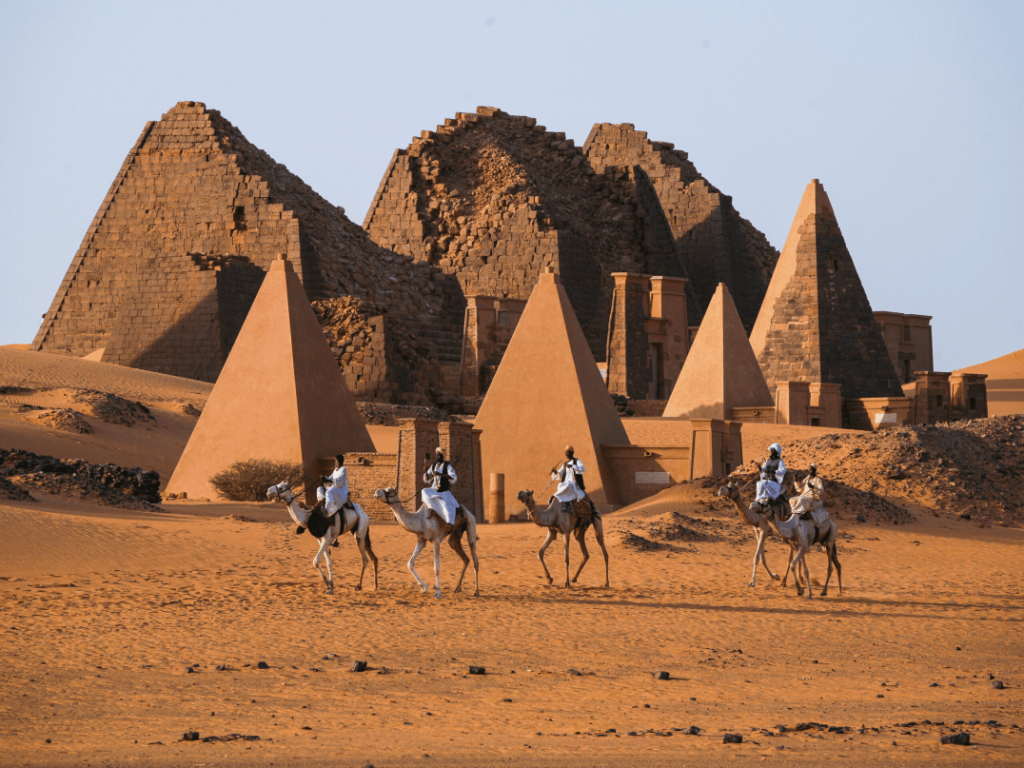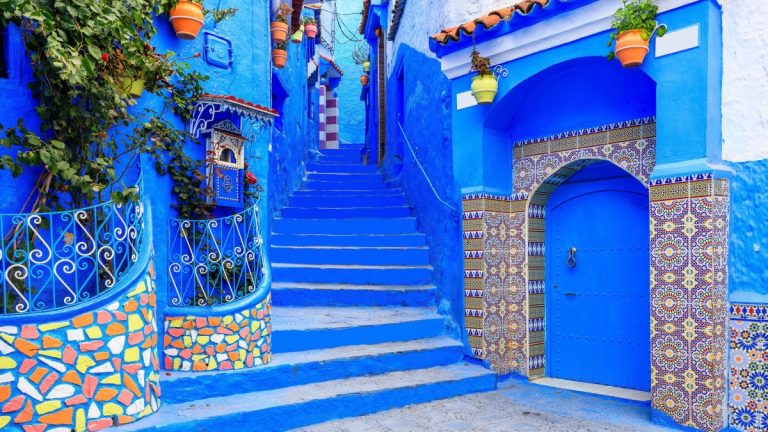Sudan might not be the first country that comes to mind when Nigerians plan a trip in Africa, but it definitely should be. While Egypt’s pyramids get all the fame, Sudan actually has more than 200 pyramids spread across ancient cities like Meroë, Nuri, and El-Kurru. These structures were built by the Nubian Kingdom of Kush, one of Africa’s most powerful civilizations. Though they are smaller than the Giza pyramids, they hold great historical importance and provide a genuine, less commercialized experience.
For Nigerian travelers, exploring the pyramids of Sudan offers a chance to dive into history and test their adventurous spirit. Unlike tourist-heavy Egypt, Sudan lets you stand among ancient ruins and connect deeply with Africa’s hidden past. This guide covers everything you need to know as you explore the pyramids of Sudan, including visa applications, travel routes, security issues, and the best ways to visit the archaeological sites.
Do Nigerians Need a Visa to Visit Sudan?
Yes, Nigerians need a visa before entering Sudan. Tourist visas are usually valid for 30 days, but they can sometimes be extended.
To apply for a Sudanese tourist visa, you will need:
- A valid Nigerian passport (with at least 6 months remaining).
- Two passport photos.
- A completed visa application form.
- A flight booking.
- A hotel reservation or an invitation letter from a host in Sudan.
- A bank statement or proof of financial ability.
- A visa fee (which varies depending on processing).
You usually make applications at the Embassy of Sudan in Abuja. Processing can take about 7 to 14 working days.
Note: Sudan has experienced political unrest in recent years. Always check current travel advisories and confirm if visas are being issued before making solid plans.
How to Get to Sudan from Nigeria
There are no direct flights from Nigeria to Sudan, so you will need to connect through other African cities.
- Via Addis Ababa: Ethiopian Airlines connects Lagos or Abuja to Khartoum, Sudan’s capital.
- Via Cairo: EgyptAir links Lagos or Abuja to Khartoum with a stop in Cairo.
- Via Nairobi: Kenya Airways and other regional airlines occasionally connect through Nairobi.
Best Time to Visit Sudan’s Pyramids
Sudan has a very hot climate, with summer temperatures exceeding 40°C. The best time to visit is from November to February when the weather is cooler and outdoor exploration is more pleasant.
Major Pyramid Sites in Sudan
Sudan’s pyramids are mainly found in the Nile Valley, the heart of the Kingdom of Kush. As a Nigerian traveler, here are the must-see sites:
1. The Pyramids of Meroë
- About 250 km northeast of Khartoum.
- The most renowned spot, known as the Meroitic Pyramids.
- Contains over 100 pyramids belonging to kings and queens of the Kushite Kingdom.
- Recognized as a UNESCO World Heritage Site.
- Entrance fee is about $20 for foreigners.
Unique feature: They are narrower and steeper than Egyptian pyramids and have decorated chapels at their bases.
2. Nuri Pyramids
- Located north of Khartoum, near the 4th Cataract of the Nile.
- Burial site of King Taharqa, one of the most notable Kushite rulers.
- Less visited by tourists, making it a peaceful spot.
3. El-Kurru Pyramids
- Another royal necropolis for early Kushite kings.
- Features underground tombs adorned with colorful wall paintings and inscriptions.
4. Jebel Barkal
- Considered sacred by Egyptians and Nubians alike.
- Contains smaller pyramids and temples dedicated to Amun.
- Also a UNESCO site.
How to Travel Around Sudan to Visit the Pyramids
From Khartoum, you can reach the pyramid sites by:
- Private Car Hire: This is the most dependable option. Hiring a driver and 4×4 costs about $80 to $100 per day. This is recommended if traveling with friends.
- Tour Companies: Local tour operators in Sudan offer packages that cover Meroë, Jebel Barkal, and Nuri. Prices vary from $500 to $1,000 for multi-day tours, including transport and accommodation.
- Public Transport: Local buses run between Khartoum and Atbara (close to Meroë), but there are limited connections to the pyramid sites. This option is not recommended for first-time travelers who are unfamiliar with Sudan.
Costs of Exploring Sudan’s Pyramids
Here’s what a Nigerian traveler might expect to spend on a 5 to 7-day trip:
- Visa Fee: $100.
- Transport: About $80 per day for car hire or over $500 for organized tours.
- Entrance Fees: Around $20 per site.
Accommodation Options
In Khartoum, you can choose from the Corinthia Hotel (luxury), Acropole Hotel (mid-range), or budget guesthouses. Near Meroë, the Meroë Tented Camp is the closest accommodation to the pyramids and offers desert views. Staying near Meroë lets you visit the pyramids at sunrise or sunset when the light is beautiful and the temperatures are cooler.
Safety Concerns and Tips
Sudan has dealt with political unrest in recent years, occasionally leading to protests or security issues in Khartoum. Nigerian travelers should:
- Check the latest travel advisories before leaving.
- Register with the Nigerian embassy in Khartoum upon arrival.
- Avoid political gatherings or demonstrations.
- Dress modestly, as Sudan is a conservative Islamic country.
However, the pyramid regions (Meroë, Nuri, etc.) are relatively safe, and locals are known for their hospitality.
Cultural Etiquette for Nigerians in Sudan
Sudanese people are warm and friendly but hold conservative views.
- Greetings are important. Always greet with “As-Salaam Alaikum.”
- Women should dress modestly, opting for long dresses or trousers with scarves.
- Alcohol is not allowed in Sudan don’t attempt to bring any.
- It is illegal to photograph government buildings, bridges, or military areas. Always ask permission before taking pictures of locals.
Why Sudan’s Pyramids Are Special
For Nigerian travelers, visiting the pyramids in Sudan is more than just a tourist activity; it’s a chance to reconnect with African history. The Kingdom of Kush once ruled over Egypt and parts of the Middle East. Its pharaohs constructed these pyramids as symbols of power, wealth, and faith.
Unlike the crowded sites in Egypt, Sudan’s pyramids let you walk alone among ruins, touch ancient stones, and experience the stillness of the desert. It’s rare to find a place where history feels so unfiltered.
Travel Insurance for Sudan
Due to the limited healthcare system in Sudan, Nigerian travelers should not go without comprehensive travel insurance. Look for policies that cover:
- Medical emergencies.
- Evacuation in case of serious illness or political unrest.
- Trip cancellation.
- Lost luggage.
Frequently Asked Questions
Q: How long can Nigerians stay in Sudan with a tourist visa?
A: Up to 30 days, with possible extensions.
Q: Is it possible to combine a trip to Sudan and Egypt?
A: Yes. Many travelers cross the border from northern Sudan into southern Egypt by road or Nile cruises.
Q: Do I need a tour guide to visit the pyramids?
A: It’s not mandatory, but highly recommended. Guides can provide historical context and ease travel logistics.
Q: Is Sudan safe for Nigerian tourists?
A: Yes, especially outside Khartoum. Just avoid protest areas and stick to tourist routes.
Q: Can Nigerians pay in naira in Sudan?
A: No. Bring US dollars or euros to exchange for Sudanese pounds.
For Nigerians looking for a unique African adventure, Sudan is a hidden gem. The pyramids of Meroë, Nuri, and El-Kurru reveal a forgotten chapter of African history, where Nubian kings held great power and influence. Visiting these pyramids is like walking in the footsteps of ancestors, discovering a history that is equally incredible as Egypt’s.
While the trip requires some planning visa applications, budgeting, and cultural understanding the experience is unforgettable. Picture yourself in quietude among ancient pyramids, surrounded by desert winds and the echoes of history. That is the allure of Sudan.
If you’re a Nigerian traveler interested in blending history, adventure, and cultural exploration, put Sudan’s pyramids at the top of your African travel list.





Leave a Comment